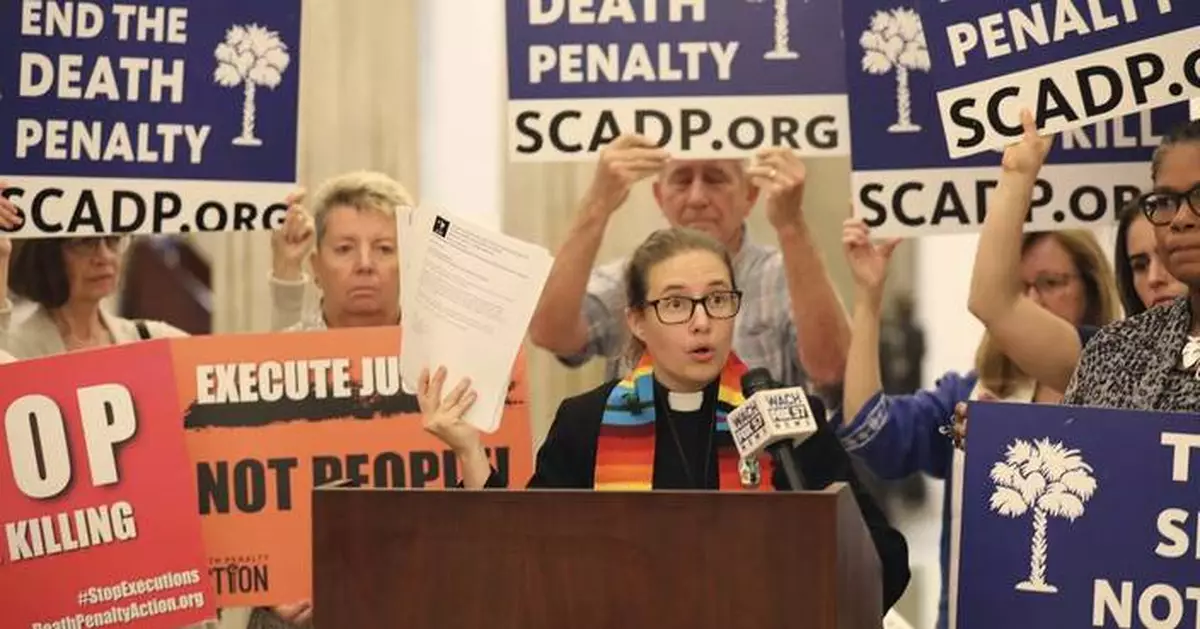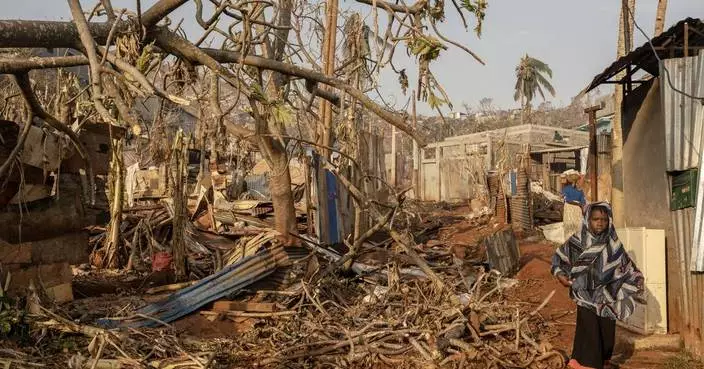COLUMBIA, S.C. (AP) — The South Carolina Supreme Court has again refused to stop the execution of inmate Freddie Owens who is set to die Friday by lethal injection.
The justices ruled Thursday that a sworn statement from a friend whose testimony helped convict Owens and who now says he lied to save himself from the death chamber wasn't enough to halt prison officials from putting Owens to death.
His execution is set for Friday at 6 p.m. at a Columbia prison for the killing of a Greenville convenience store clerk in 1997. It would be South Carolina's first execution in more than a decade.
Owens' lawyers on Wednesday filed the statement from his co-defendant Steven Golden saying Owens wasn’t at the store when Irene Graves was killed during a robbery. They said they were disappointed by the justices' decision.
“South Carolina is on the verge of executing a man for a crime he did not commit," attorney Gerald “Bo” King said in a statement. “We will continue to advocate for Mr. Owens.”
Prosecutors reiterated that several other witnesses testified that Owens told them he pulled the trigger. And just like it did last week when Golden said in a sworn statement he had a a secret deal with prosecutors that he never told the jury about, the state Supreme Court agreed the execution should go on.
The justices wrote on Thursday that there was no evidence Golden had an independent attorney to talk to about his recent statements and they did not name who might have killed Graves if Owens didn't do it.
In his statement, Golden said he blamed Owens because he was high on cocaine and police put pressure on him by claiming they already knew the two were together and that Owens was talking. Golden also said he feared the real killer.
“I thought the real shooter or his associates might kill me if I named him to police. I am still afraid of that. But Freddie was not there,” Golden wrote in his statement.
Golden testified at Owens' trial, saying prosecutors promised to consider his testimony in his favor but he still faced the death penalty or life in prison. He was eventually sentenced to 28 years in prison after pleading guilty to a lesser charge of voluntary manslaughter, according to court records.
"I’m coming forward now because I know Freddie’s execution date is September 20 and I don’t want Freddie to be executed for something he didn’t do. This has weighed heavily on my mind and I want to have a clear conscience," Golden wrote in his statement.
Prosecutors have said Golden wasn't the only evidence linking Owens to the crime since other friends testified that they, along with Owens, had planned to rob the store. Those friends said Owens bragged to them about killing Graves. His former girlfriend also testified that he confessed to the killing.
Prosecutors argued last week that Golden's decision to change his story shouldn't be enough to stop the execution because he has now admitted to lying under oath, thereby showing that he cannot be trusted to tell the truth.
“There is no indication that Golden will testify; there is no reasoning to why Owens would admit the shooting (of) Ms. Graves to officers, his girlfriend, and his mother if he was not the shooter as now claimed,” the state Attorney General's Office wrote in court papers.
Also on Thursday, a group called South Carolinians for Alternatives to the Death Penalty presented a petition with more than 10,000 signatures to Gov. Henry McMaster's office asking him to reduce Owens' sentence to life in prison.
“Justice works for restoration. You cannot restore someone who you kill,” said the group's executive director, Rev. Hillary Taylor, as she read from one of the comments on the petition.
McMaster, a Republican, has said he will wait to announce his decision on clemency until prison officials call him minutes before the execution begins.
Owens would be the first person executed in South Carolina in 13 years after the state struggled to obtain drugs needed for lethal injections because companies refused to sell them if they could be publicly identified.
The state added a firing squad option and passed a shield law to keep much of the details of executions private. The state Supreme Court then cleared the way for the death chamber to reopen this summer.
Five other inmates are also out of appeals and the state can schedule executions every five weeks.
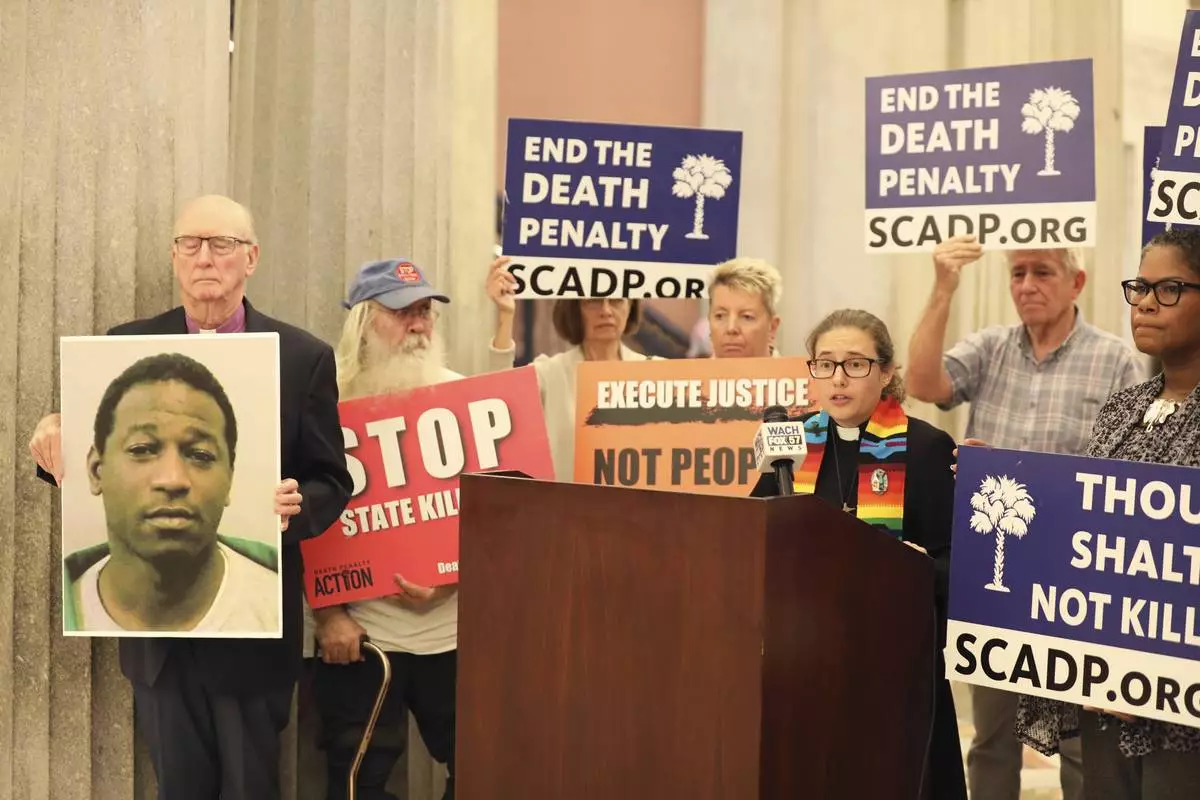
South Carolinians for Alternatives to the Death Penalty Executive Director Rev. Hillary Taylor speaks at a news conference before delivering petitions to stop the execution of Freddie Owens at the South Carolina Statehouse in Columbia, S.C., Thursday, Sept. 19, 2024. (AP Photo/Jeffrey Collins)
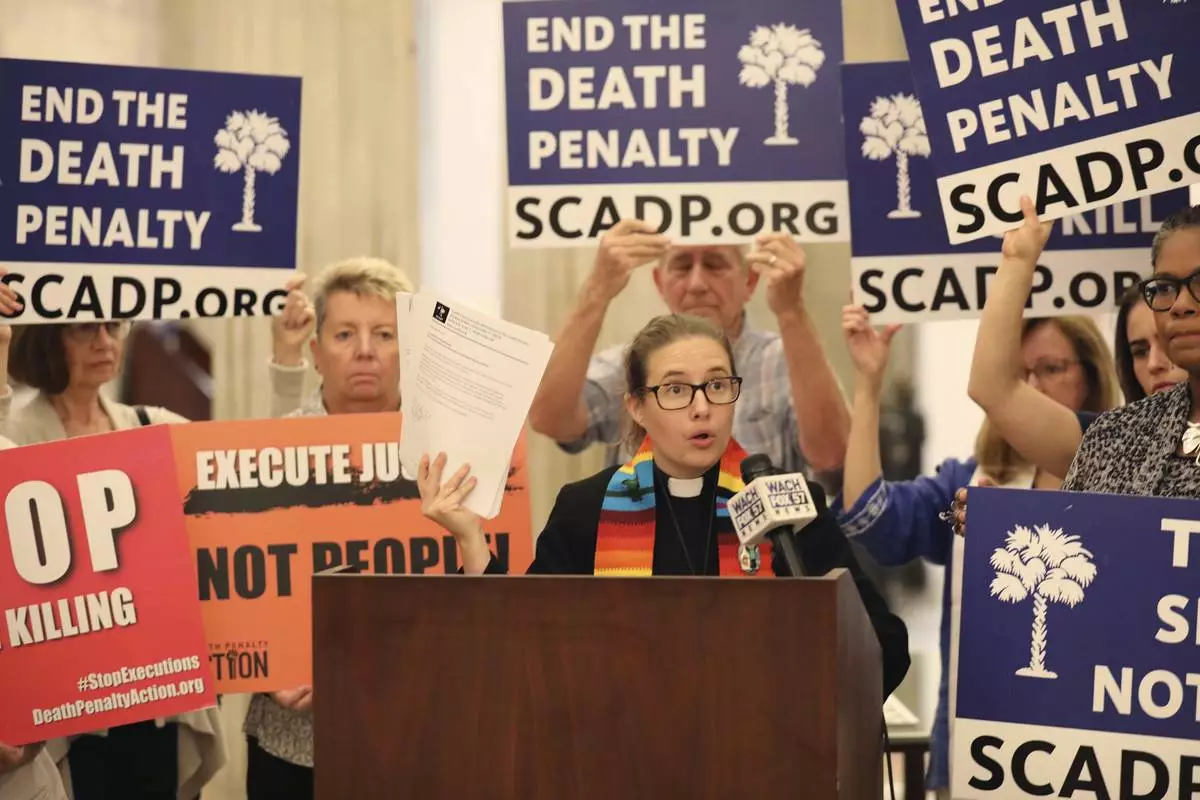
South Carolinians for Alternatives to the Death Penalty Executive Director Rev. Hillary Taylor speaks at a news conference before delivering petitions to stop the execution of Freddie Owens at the South Carolina Statehouse in Columbia, S.C., Thursday, Sept. 19, 2024. (AP Photo/Jeffrey Collins)
TEL AVIV, Israel (AP) — A rocket fired from Yemen hit an area of Tel Aviv overnight, leaving 16 people slightly injured by shattered glass, the Israeli military said Saturday, days after Israeli airstrikes hit Houthi rebels who have been launching missiles in solidarity with Palestinians.
A further 14 people sustained minor injuries as they rushed to shelters when air raid sirens sounded before the projectile hit just before 4 a.m. Saturday, the military said.
The Houthi rebels issued a statement on the Telegram messaging app saying they had aimed a hypersonic ballistic missile at a military target, which they did not identify.
The attack comes less than two days after a series of Israeli airstrikes on Yemen’s Houthi rebel-held capital, Sanaa, and port city of Hodeida killed at least nine people. The Israeli strikes were in response to a Houthi attack in which a long-range missile hit an Israeli school building. The Houthis also claimed a drone strike targeting an unspecified military target in central Israel on Thursday.
The Israeli military says the Iran-backed Houthis have launched more than 200 missiles and drones during the Israel-Hamas war in Gaza. The Houthis have also been attacking shipping in the Red Sea and Gulf of Aden and say they won’t stop until there is a ceasefire in Gaza.
The Israeli strikes Thursday caused “considerable damage” to the Houthi-controlled Red Sea ports “that will lead to the immediate and significant reduction in port capacity,” U.N. spokesman Stephane Dujarric said. The port at Hodeida has been key for food shipments into Yemen in its decade-long civil war.
U.N. Secretary-General Antonio Guterres said both sides’ attacks risk further escalation in the region and undermine U.N. mediation efforts.
In the Gaza Strip on Saturday, mourners held the funerals of 19 people — 12 of them children — killed in Israeli strikes on Friday and overnight.
One of the strikes hit a residential building in the built-up Nuseirat refugee camp in central Gaza, killing at least seven Palestinians, including five children and one woman, and injuring 16 others, health officials said.
In Gaza City, another strike on a house overnight killed 12 people, including seven children and two women, according to Al-Ahli Hospital where the bodies were taken.
Mourners gathered at the hospital in Gaza City Saturday morning. Women comforted each other as they wept over the bodies before they were carried away. One man, stony-faced, cradled a tiny shroud-wrapped body in his arms as he carried it along the funeral procession.
In Al-Aqsa Hospital of Deir al Balah, white body bags containing those killed in Nuseirat were taken from the morgue and loaded onto the back of an open truck to be taken for burial.
Overall, Gaza's Health Ministry said Saturday that 21 people had been killed and 61 were wounded over the past 24 hours.
Israel faces heavy international criticism over the unprecedented levels of civilian casualties in Gaza and questions about whether it has done enough to prevent them.
Israel says it only strikes militants, and blames the Hamas militant group for civilian deaths because its fighters operate in residential areas.
More than 45,200 people have been killed and more than 107,500 wounded in the Gaza Strip since October 2023, when a Hamas attack in Israel killed about 1,200 people and triggered the devastating 14-month war in Gaza. Local health officials do not distinguish between civilians and combatants, but have said more than half of the fatalities are women and children.
The Israeli military organization dealing with humanitarian affairs for Gaza said Saturday it had led a “tactical coordinated operation” delivering thousands of food packages, flour and water to the Beit Hanoun area in the north of the Gaza Strip.
The organization, known by its acronym COGAT, said trucks from the U.N. World Food Program transported 2,000 food packages, 1,680 sacks of flour and thousands of liters of water to distribution centers in the area on Friday.
Aid groups have said previously that military operations and armed gangs have hindered their ability to distribute aid to civilians in need.
Gaza's Health Ministry issued an urgent appeal Saturday for medical and food supplies to be delivered to Kamal Adwan Hospital in Beit Lahia, near Beit Hanoun in northern Gaza, while the hospital director described dire conditions.
The ministry said in a statement that there was continuous gunfire and Israeli shelling near the hospital. “Shells have struck the third floor and the hospital’s entrances, creating a state of panic,” the ministry said.
Hospital Director Dr. Husam Abu Safiyeh said the facility was “facing severe shortages."
“Despite promises, we have not received the necessary supplies to maintain electricity, water, and oxygen systems," Abu Safiyeh said. "Our requests for essential medical supplies and staff have largely gone unmet.”
He said the World Health Organization had delivered 70 units of blood, but that the hospital requires at least 200 units to meet urgent needs. He said 72 wounded people were being treated at the hospital.
The shortages extend beyond medical necessities. “Food is very scarce, and we cannot provide meals for the wounded. We are urgently calling on anyone who can provide supplies to help us,” he said. “The staff is working around the clock, yet we cannot even provide meals for them.”
Shurafa reported from Deir al Balah, Gaza Strip. Associated Press writers Elena Becatoros in Majdal Shams, Golan Heights, contributed to this report.
Follow AP’s war coverage at https://apnews.com/hub/israel-hamas-war
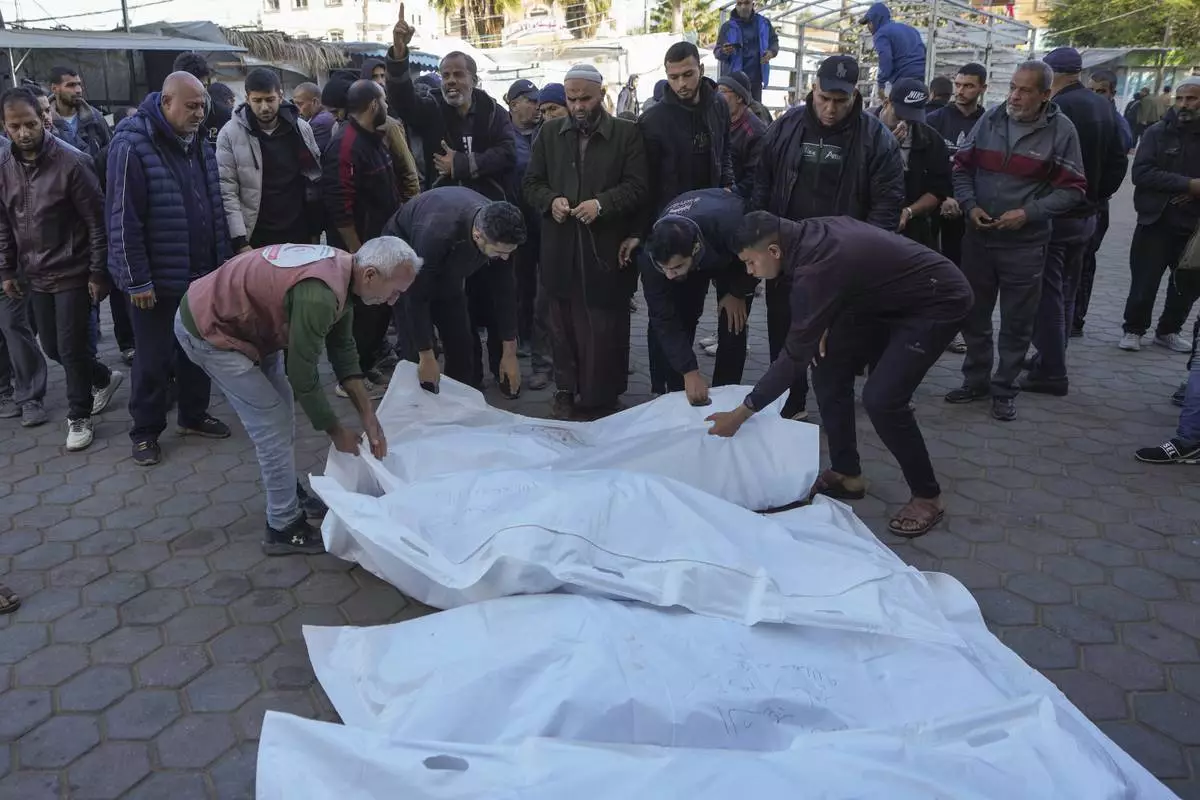
Bodies of victims of an Israeli airstrike at the Nuseirat refugee camp are prepared for the funeral prayer outside the Al-Aqsa Martyrs hospital in Deir al-Balah, Gaza Strip, Saturday, Dec. 21, 2024. (AP Photo/Abdel Kareem Hana)
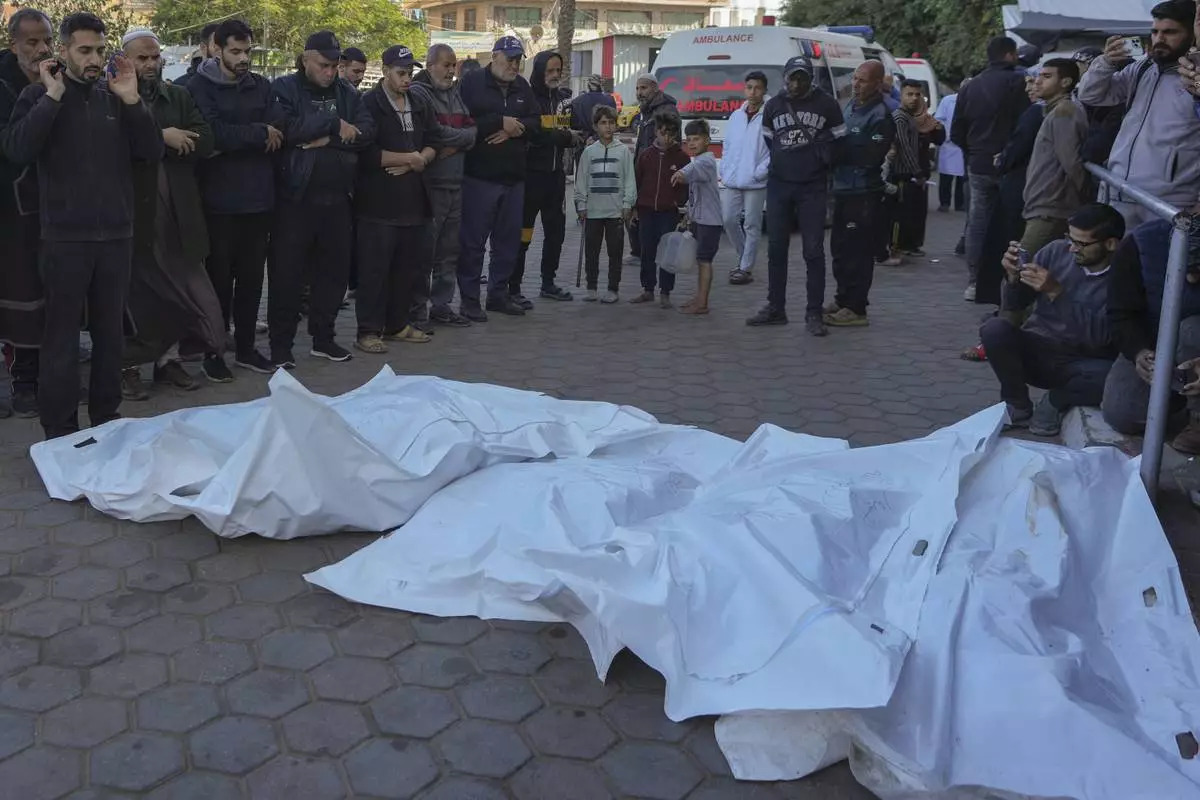
Men pray over the bodies of victims of an Israeli airstrike at the Nuseirat refugee camp during a funeral prayer outside the Al-Aqsa Martyrs hospital in Deir al-Balah, Gaza Strip, Saturday Dec. 21, 2024. (AP Photo/Abdel Kareem Hana)
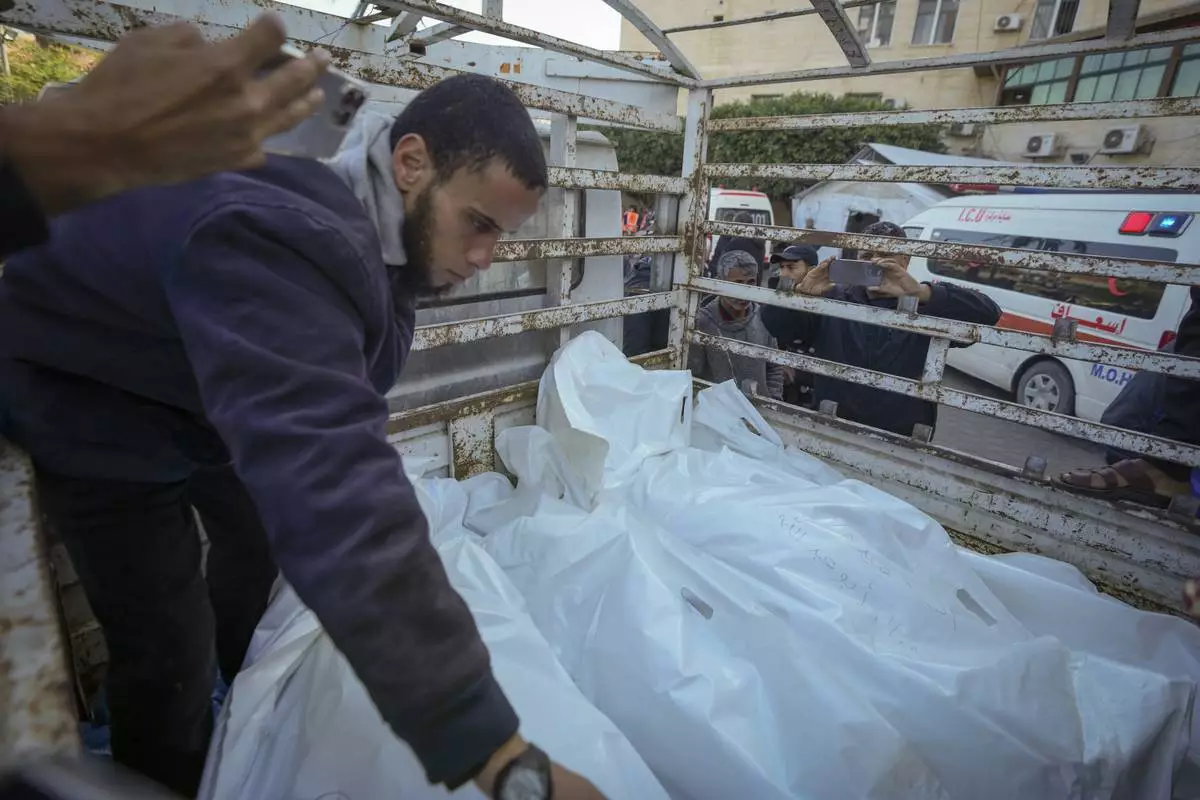
Bodies of victims of an Israeli airstrike at the Nuseirat arrive at the Al-Aqsa Martyrs hospital before their funeral in Deir al-Balah, Gaza Strip, Saturday, Dec. 21, 2024. (AP Photo/Abdel Kareem Hana)
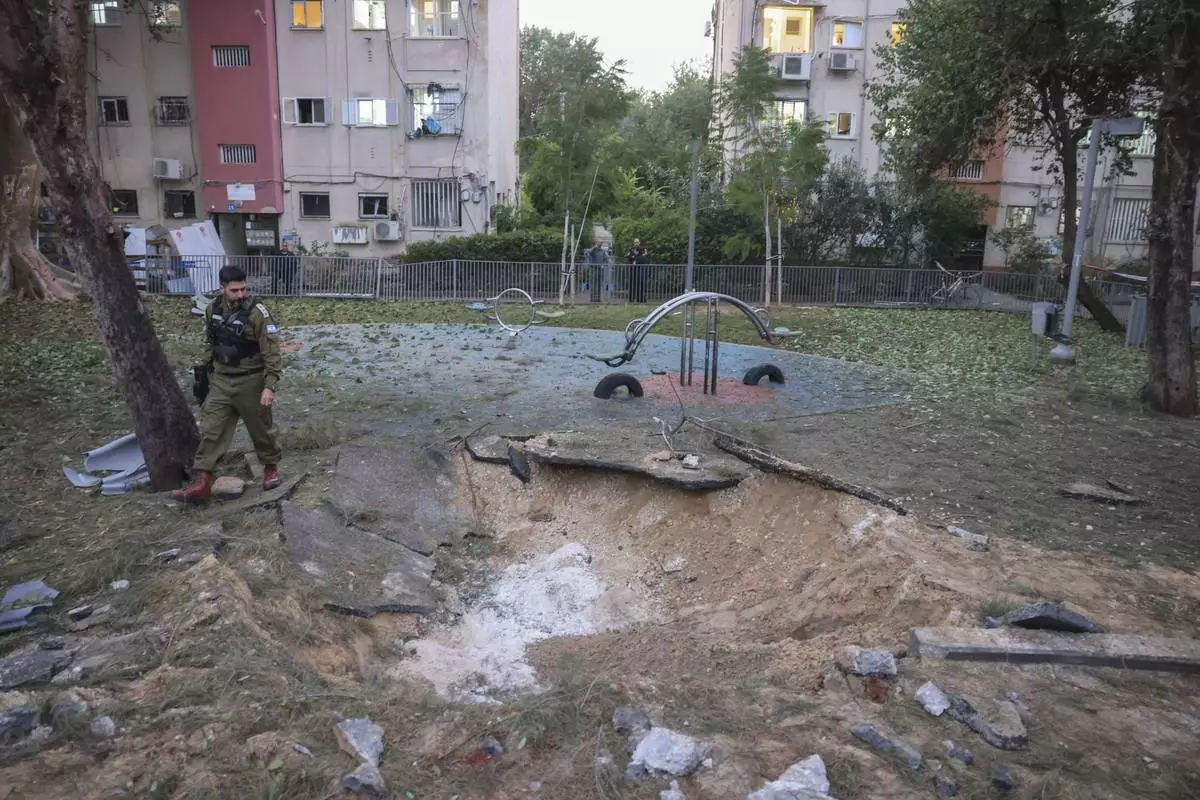
An Israeli soldier observes the site where the missile launched from Yemen landed Jaffa district, in Tel Aviv, Israel, Saturday, Dec. 21, 2024. (AP Photo/Tomer Appelbaum)




